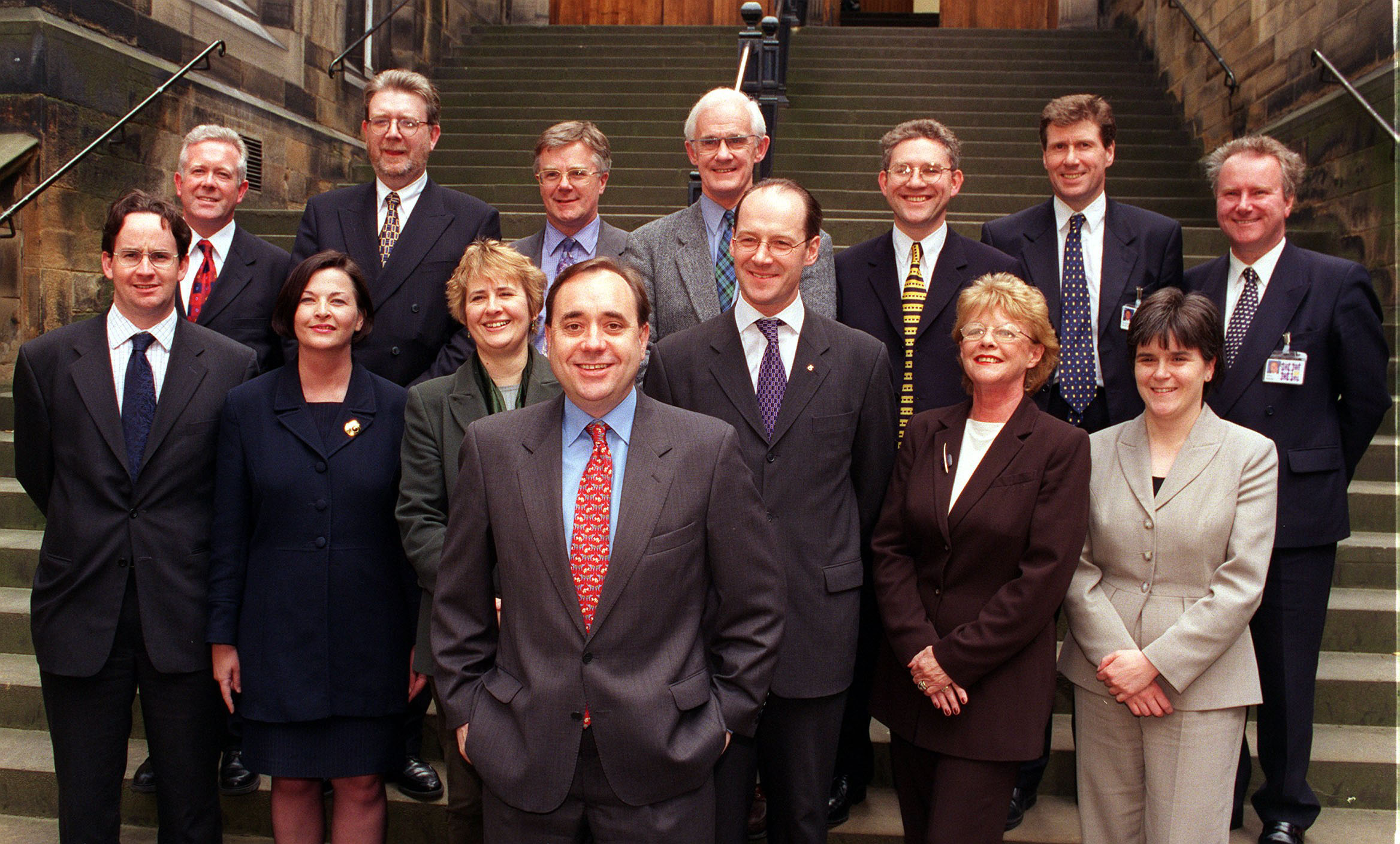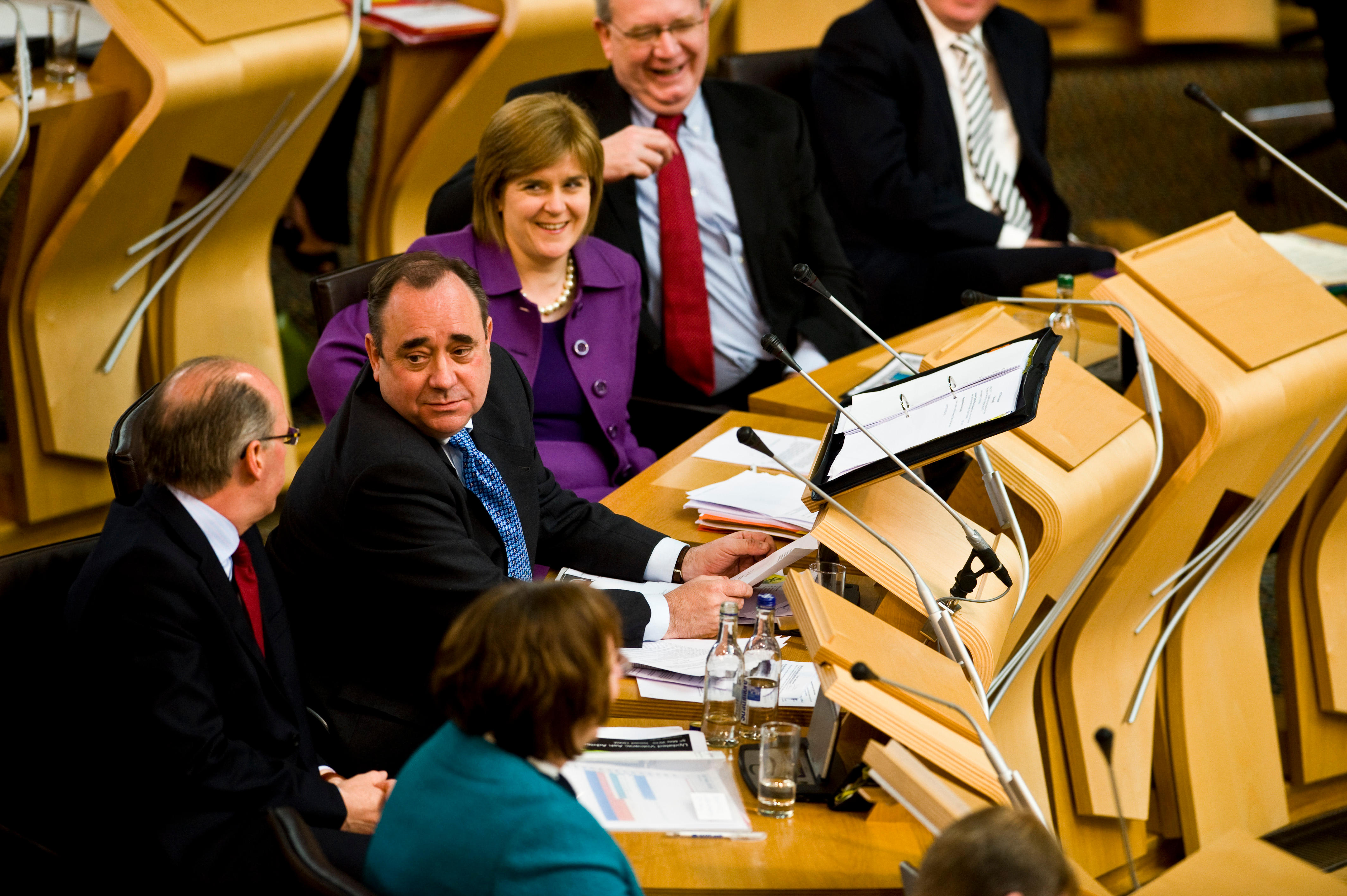Four successive prime ministers have been placed under zero pressure to concede to Scotland’s demands
Scotland’s first SNP-led devolved administration was a radical departure from the politics that had come before with even a change in name from “Executive” to “Government”.
The Scottish Parliament elections of 2007 and 2011 broke the mould of Scottish politics.
Nowadays it is difficult for anyone under 30 to recall the time when the Labour Party ruled the roost in Scotland. Back in 2007, next to no one could recall a time when they didn’t.
Of course, there had been the occasional by-election tremor, but when it came down to a general election – UK or Scottish – Labour would end up cock of the north, as had been their accustomed position for half a century.
When the seismic shock did arrive, it was more a crack in the tectonic plate than a full fissure – the SNP beat Labour in 2007 by a single seat and a single per cent of the vote. In consequence, I became the first Nationalist first minister of Scotland in a parliament of 50 independence backers but around 80 unionists.
Nevertheless, the psychological impact was profound. Once Goliath had been felled, the aura of invincibility went with it. Equally, when the SNP demonstrated it could actually run the show, as opposed to just talking about it, we gradually earned respect which in turn led to growing confidence in the process of self-government.

Salmond and his shadow cabinet in 1999 | Credit: Alamy
Given that at any point in that plurality parliament of 2007 our unionist opponents could have combined to remove us from office, and a unionist press would have cheered them on, it was imperative not to give them a cause to unite behind.
Looking back, I am not altogether sure how we pulled it off – probably a combination of bravado and Bruce Crawford, the superbly unflappable Minister of the Parliament. Of course, some of the most important things achieved, such as getting rid of PFI and ensuring value for money from capital contracts through the Scottish Futures Trust, or even renaming the Scottish “Executive” as the Scottish Government (over the course of the weekend it took to paint the signage!) didn’t require legislation. We just got on with them.
Major issues can still pass in minority parliaments. Scotland ended up in control of climate change legislation by accident – it hadn’t been considered important enough to reserve to Westminster in the Scotland Act of 1998. However, in terms of demonstrating that Scotland could address the biggest issue facing the planet, and manage the renewable energy expansion, which was one part of our policy response, it could not have served better. The Climate Change Act of 2009 passed in the parliament unanimously.
There are also advantages in being a minority government. A perilous parliamentary position breeds solidarity among the MSP group – everybody is under fire in the trenches together. The press wondered at the famed SNP discipline. The true wonder is that it was self-discipline – minority governments can’t afford any of the overweening sense of entitlement which inhabits the government benches of today.
Instead, minority keeps everyone on their toes knowing that any grievous mistake could bring down the government itself. Avoiding Ferguson’s-style fiascos comes not from luck, but from the recognition that even one mistake on such a scale would have been fatal to the entire government.
Ultimately, the only real protection that a minority government has is electoral popularity; you have to be less frightened of an election than your opponents. Opposition parties unite against measures like abolishing education fees, free prescriptions or ending bridge tolls at their grave peril. And when Labour, more by accident and Green party perfidy than any design, voted down our budget in January 2009, they ended up backing down the following week rather than facing the public wrath.
The success of minority government allowed us to run the following 2011 election campaign on the theme of “record, team, vision”. It succeeded beyond any forecast and shattered the ceiling of an electoral system specifically designed to prevent a nationalist majority, with the SNP alone claiming 69 seats.
The strength of the record and the quality of the team allowed the serious pursuit of the vision of independence.
In policy terms, our 2011 majority allowed more adventure and controversy. Some of these initiatives were highly successful such as equal marriage and minimum pricing for alcohol. Some less so, such as the anti-sectarian legislation. All were designed to right wrongs in Scottish society.
The restraints on policy were no longer the lack of a parliamentary majority, but the knowledge that everything we proposed should be designed, de minimis, to do no damage to the independence cause, which was then, and still should be, the SNP’s raison d’être.
It is this more than anything else which makes it difficult to understand the reasoning behind the Scottish Government’s headlong pursuit of the Gender Recognition Reform Bill in the current parliament.
The soon-to-be Baron Jack got them off the hook, at least in the short term, by his ham-fisted invoking of section 35 of the Scotland Act, turning the issue into a constitutional confrontation instead of an equalities debate. If he had been content with just referring it to the Supreme Court (under schedule 6) he might have hoisted the first minister on her own petard. But nationalists really should not have to depend on the crassness of a wannabe viceroy to save their political skins.
Sometimes the GRR bill is compared with the Equal Marriage Act of 2014, in that they are both controversial pieces of social legislation but overriding commitments to equality.

Salmond at First Minister's Questions in 2010 | Credit: Alamy
But there the comparison breaks down. The equal marriage legislation was indeed controversial and strongly opposed, but it was never going to become a constitutional issue, because similar English legislation was coming on behind. In addition, back in the day, we worked to reassure religious denominations without compromising the principle of the civil legislation. And no one was told that their concerns were not valid. It is always important to recognise that an absolute majority does not confer absolute wisdom.
Above all, equal marriage extended human rights without prejudicing the rights of others. The GRR bill is still perceived to threaten hard-won women’s rights and therefore that entrenched opposition is likely to continue. The government’s attitude towards even common sense amendments proposed by their own seven rebels was for the most part disappointing and unyielding. A different attitude might have reduced concerns.
It would seem extraordinarily short sighted, in terms of the independence debate, to risk the alienation from their own parliament of a substantial group of campaigners, many of whom would be natural allies of the independence cause.
Even when personal relationships are good, there will always be an inevitable tension between the policy programme of a nationalist administration in Edinburgh and a Tory one in London. Some of that is entirely constructive, such as the extension of voting rights to 16 and 17-year-olds.
However, the proper chosen ground for a showdown with Westminster for a Scottish Government, which has independence as its prime directive, should be on Scotland’s national right of self-determination or on an economic or social objective which carries overwhelming public backing.
The landslide majority of 2011 put us in a strong position to deliver the referendum which had been the SNP’s route to independence since the party decision to campaign for the Scottish Parliament in 1997. It was accepted, even by our opponents, that a referendum was the democratic response to electoral victory of the SNP. That had been agreed by myself and the late Donald Dewar ten years before in the process of establishing the parliament. It was assented to even by the unionist parties in the Scottish Parliament.
But in order to achieve agreement, the UK Government had to believe that there would be a response from Scotland if they refused or, more likely, tried to place unreasonable conditions on agreement, such as a double referendum or some form of blocking mechanism, like the notorious 40 per cent clause from 1979.
In the 2011 parliament, such a response would have been led by the Scottish Parliament passing its own Referendum Act, proposing a question which would have been likely to survive court challenge, for example asking for public agreement that the powers of the parliament should include an independence referendum. Having prepared the deterrent, the button didn’t need to be fired.
When Prime Minister David Cameron signed the Edinburgh Agreement in 2012, he did so in my office at St Andrews House, and staring at an electoral map of Scotland emblazoned in yellow, showing the complete electoral dominance of the SNP. That electoral dominance was used for its proper purpose of securing the opportunity for Scots to vote themselves into independence.
Since then, electoral support has largely remained but, particularly since Brexit, four successive UK prime ministers have been placed under zero political pressure to concede Scotland’s demands. As a result, we have moved backwards, from Scotland’s national rights being respected to being disrespected. Assuming that has not been deliberate, then it is an example of extraordinary political ineptitude.
In the near 25 years of our re-convened parliament, a great deal has been achieved for Scotland. In party political terms the SNP have replaced the Labour Party as the dominant party of Scotland. In each twist and turn of that story, Holyrood magazine has charted every move and counter move.
But one thing I certainly did not foresee is that over the course of that epic quarter of a century, the transformation would be about more than the numerical balance between the parties; it now would be within the nature of the parties themselves. If I could paraphrase a passage from a famous moral tale about politics: the people outside looked from SNP to Labour, and from Labour to SNP, and from SNP to Labour again; but already it was impossible to say which was which.
Holyrood Newsletters
Holyrood provides comprehensive coverage of Scottish politics, offering award-winning reporting and analysis: Subscribe